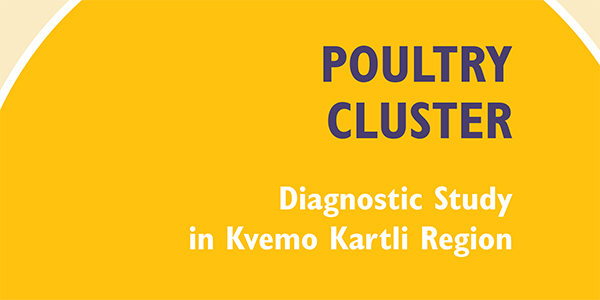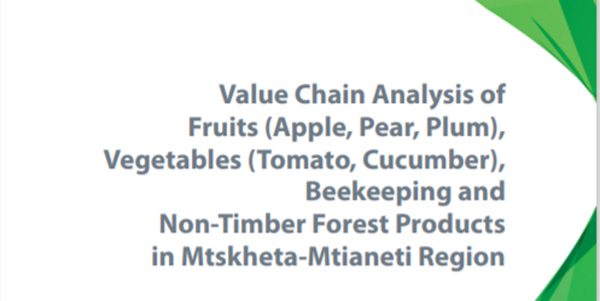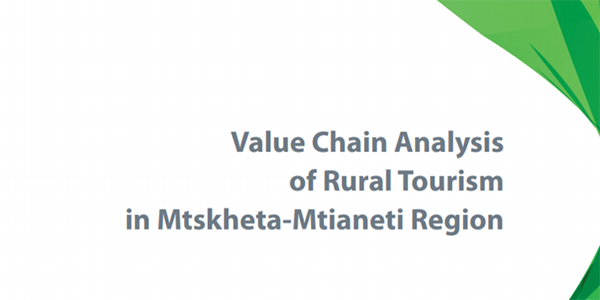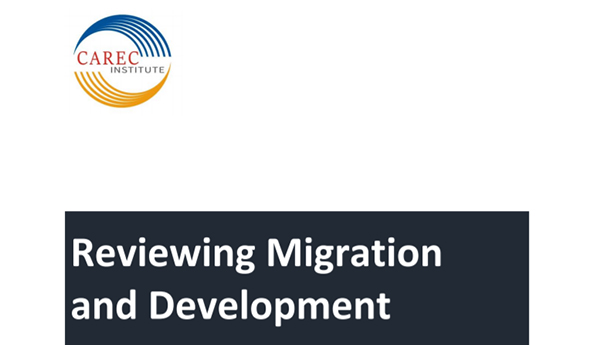

PMC Research conducted a poultry cluster diagnostic study in Kvemo Kartli region of Georgia, and developed a cluster map, and elaborated short-term objectives as well as a long-term vision for the development of this cluster.
The study is part of the “EU Innovative Action for Private Sector Competitiveness in Georgia (EU IPSC)” program, which is a joint initiative of the European Union and the following four UN agencies: the United Nations Development Programme (UNDP); the Food and Agriculture Organization (FAO); the United Nations Industrial Development Organization (UNIDO); and the International Organization for Migration (IOM).

PMC Research described both the history and the current reality for the marine fishing cluster in Samegrelo-Zemo Svaneti region of Georgia, analyzed business operations within it, developed a cluster map, and elaborated short-term objectives as well as a long-term vision for the development of this cluster.
The study is part of the “EU Innovative Action for Private Sector Competitiveness in Georgia (EU IPSC)” program, which is a joint initiative of the European Union and the following four UN agencies: the United Nations Development Programme (UNDP); the Food and Agriculture Organization (FAO); the United Nations Industrial Development Organization (UNIDO); and the International Organization for Migration (IOM).

PMC Research described both the history and the current reality for the hazelnut processing cluster in Samegrelo-Zemo Svaneti region of Georgia, analyzed business operations within it, developed a cluster map, and elaborated short-term objectives as well as a long-term vision for the development of this cluster.
The study is part of the “EU Innovative Action for Private Sector Competitiveness in Georgia (EU IPSC)” program, which is a joint initiative of the European Union and the following four UN agencies: the United Nations Development Programme (UNDP); the Food and Agriculture Organization (FAO); the United Nations Industrial Development Organization (UNIDO); and the International Organization for Migration (IOM).

The goal of this research is twofold. Primarily, it provides an assessment of the cybercrime situation in Georgia and projection of possible developments, as well as envisages policy recommendations for responsible public authorities. The secondary, but not less important goal is to facilitate awareness-raising through developing analytical information regarding problems and ways of their solutions. Georgian citizens are end victims who suffer from any national security threats including cybersecurity incidents and cybercrimes. Informing the public and raising awareness gain utmost importance, especially in conditions of hybrid threats. Social resilience could not be ensured without a wider engagement of informed and socially active citizenry.
Key Findings
- Cybercrime is still an emerging phenomenon in Georgia, its damaging potential is not fully exposed and the threat is not perceived properly either by the government or the society;
- Highly likely cybercrime remains underreported in Georgia as in many other countries of our region;
- The MIA is focused on pure cybercrimes and does not calculate cyber-enabled crimes under cybercrime statistics that leaves room for ambiguity;
- From the perspective of criminal justice, policy cybercrime still does not expose serious challenge to society as its share in general criminal statistics is not significant;
- In the context of national security, cybercrime is more dangerous than other crimes as it represents an instrument of transformation of external threats into serious problems of internal security;
- Georgian Police handle cybercrime generally in a reactive manner, with more focus on response - investigation and pursuit, lacking a comprehensive preventive approach;
- LEA has certain problems in investigation and digital forensic, especially, in the regions;
- Lack of coordinated government policy, mature engagement of the private sector and low public awareness in the light of digitalization of social life, increasing internet and ICT access are main factors affecting cybercrime statistics negatively;
- Transnational criminal activities expose little danger to Georgia cybersecurity nowadays, but it`s predictable that GOCGs being an important part of transnational organized criminality, will increase their illegal activities in the digital space;
- Lack of sustainable financial support to develop key cybersecurity services and programs is observed;
- As main determinants affecting of raising cybercrime in Georgia are mostly generated through complex internal socio-economic and technological developments and external geopolitical processes and the GOG has limited capacity to influence significantly on most of those factors in a short-term perspective, it can be implied that in the nearest 5 years’ period, the trend of raising cybercrime rates in Georgia will be maintained. Highly likely cybercrime would be increased approximately by 25-30% per year in comparison to 2020 rates and gradually, it will easily overcome 5% share of total criminal cases registered by the police in 2022.
Recommendations
Recommendation #1. More preventive, proactive and protective policy:
- Set up a comprehensive strategic agenda for cybercrime preventive measures. Georgia needs to develop not only reactive but also proactive measures for combating cybercrime;
- Change the approach of calculating cybercrime statistics to consider numbers of cyber-enabled crimes in total number of cybercrimes;
- Develop joint interagency task force from key government stakeholder institutions, equipped with strategic, operational and tactical tools, to unify efforts and undertake comprehensive and adequate measures for deterring external threats or mitigating the risks;
- Elaborate long-term strategy and action plan for combatting cybercrime, which will include capacity building, large-scale public awareness projects jointly organized by relevant government agencies (participation of the institutions responsible for implementing educational and youth policy is highly recommended);
- Draft and adopt legislative framework empowering the police for utilization ethical hacking and other proactive measures in cyberspace;
- Increase funding of cybersecurity dimension.
Recommendation #2. Develop workforce and institutional capacity:
- Increase human and technological capacity of cybercrime investigators, especially at the regional level. Regular training programs with no gaps, as new sophisticated attacks require qualified people to deal with;
- Develop national training infrastructure for LEAs and security sector agencies to fill the gaps of human resources and facilitate professionalization of their personnel in cybersecurity, cybercrime investigation techniques and digital evidence;
- Increase efforts for participation in international exercises and trainings to increase international LEA cooperation with a special focus on combatting cybercrimes;
- Work more actively with LEAs of partner countries, international and regional law enforcement organizations in joint working groups and other platforms to detect activities of GOCGs in cyber sphere and be informed about possible threats;
- Create specialized cybercrime police units in every region of Georgia, equip them with special crime detection software and technical solutions that will increase early warning opportunities and increase other preventive technics;
- Equip and train enough police personnel properly for conducting tailored proactive policing measures countrywide.
Recommendation #3. Develop cyber culture:
- Take active measures for public education and awareness, the empowerment of Georgian information society; reduce the success rate of many forms of cybercrime by educating individuals and organizations in recognizing criminal activity before they fall victim to it;
- Through various institutional frameworks achieve engagement of multiply government agencies having a large set of beneficiaries and active partnership with the private sector in the awareness-raising process to increase the outreach;
- Implement tailored educational campaigns for professional civil servants in cybersecurity, cyber hygiene and misinformation campaigns;
- Implement tailored and large-scale awareness-raising campaigns for the most vulnerable social groups;
- Share information about threats, best practices, specialized capabilities among stakeholders to build trust and demonstrate value for them;
- Raise awareness among decision-makers and senior management of LEAs to determine strategic priorities regarding cybercrime and electronic evidence.
Recommendation #4. Co-share resources between CERT and MIA:
- Temporary secondment - assignment, transfer of LEA professional in CERT in order to get a hand-on experience of CERT incident collection and reporting, classification approaches, together define procedural and organizational formalities. On the contrary, CERT representative can be shifted to cybercrime office in order to get more insight into procedural powers, investigation techniques and assist the process with technical cyber know-how. This advice is vastly promoted by ENISA, Council of Europe as a cooperative tool between cybercrime and cybersecurity authorities;
- Adopt unified operational standards, develop the capacity of joint work; the experience of joint risk assessment teams of the MIA and the LEPL Revenue Service could be a useful example;
- Key steps required for information exchange between CERT and the police: Define a common taxonomy related to incidents and events in cybersecurity; Define an exchange standard to enable the sharing of information based on the taxonomy
- Create statistics based on the information exchanged.
Recommendation #5: Connect, communicate and collaborate:
- Strengthen formal and informal cooperation frameworks to combat cybercrime in order to build an effective and sound governance system;
- Elaborate and adopt legislative requirements for the exchange of information between public and private sectors;
- Foster cooperation between the MIA and ISPs;
- Develop a secure information sharing platform for the exchange of information on cyber-threats and incidents between cyber authorities;
- Undertake measures (including legislative amendments) to increase informed and responsible engagement of the private sector in strengthening the country`s cyber resilience.
Recommendation #6: Develop Cybercrime Reporting Mechanism:
- Establish a cybercrime reporting centre, hotline, providing a central point of contact for citizens and businesses;
- Develop coordinated mechanisms within the public and the private sector allowing citizens to report cybercrime cases, including online fraud, cyberstalking, child abuse online, identify theft, privacy and security breaches, etc.;
- Define common reporting methodology with written guidelines to broad stakeholder groups, including foreign counterparts;
- Launch awareness programs and communication campaigns to promote the regular use of reporting mechanisms by a wider community;
- Develop digital tools for cybercrime reporting.

Artificial Intelligence (AI) is increasingly becoming a part of our everyday lives. The use of Unmanned Aerial Vehicles (UAVs) was observed in the Nagorno-Karabakh conflict; AI model was developed to diagnose COVID-19. The leader of the Georgian Dream criticized opponents for using deepfake programs to misinform the electorate during the 2020 parliamentary election campaign. AI offers tremendous benefits for our societies, in terms of public governance, business development and healthcare, but it also raises important economic, legal and ethical questions.
Governments aiming to develop effective AI policies face a twofold challenge. On the one hand, they have to create an AI friendly eco-system, attract AI investors, boost the development of AI technologies, increase the industrial application of AI and therefore, improve overall, AI-generated economic and social welfare. On the other hand, governments should create policy frameworks to balance AI associated risks, which might be related to personal data protection, targeting, algorithmic discrimination, cybersecurity, and/or AI liability.
AI technologies are expected to add US$15 trillion value to the global economy by 2030. According to PricewaterhouseCoopers (PwC) research, global GDP could be up to 14% higher in 2030, as a result of AI. Several countries developed national AI strategies during the last couple of years. EU recently announced ambitious AI goals to compete with the US and China and issued several AI policy documents. Some of the EU member states (MSs) also made significant progress, in terms of national or sector-specific AI policies. US & China are world leaders in terms of AI technologies, but countries like Canada, Japan and Singapore also allocated solid resources for AI policy and research development. Leading international organizations like the World Economic Forum (WEF) and the Organization for Economic Development (OECD) established AI policy programs.
AI positioning of the developing and the developed countries differ greatly; AI could even widen the gap between the rich and the poor nations, by shifting more investments into developing countries and replacing the labour force of the developed nations. Georgia’s AI positioning in the world is modest. According to the AI Readiness Index, the country was ranked #72 out of 172 countries and #5 in the region, below Turkey, Ukraine, Belarus and Azerbaijan. Interestingly, out of 10 ranking dimensions, Georgia received the highest score in Data Representativeness (70.91) and the lowest in AI Vision (0). Georgia is a country of limited human, economic and technological resources. Considering the current AI state of play in the country and especially the issue with the “vision”, it is important to take radical and effective steps to improve global and regional AI competitiveness and ensure that Georgia is not left behind by the “AI revolution”.
Following the international experience, the first step for Georgia to tackle the AI-related challenges and opportunities could be the development of a comprehensive AI strategy. The research aims to investigate the potential of developing a national AI strategy in Georgia, which could potentially create an opportunity for further sector-specific AI policy developments/research. Strategy document could serve as the foundation for AI ethics and policy development in the country.
Working on a national AI strategy requires the involvement of a wide group of actors, including government representatives, business companies/associations, international experts, representatives of academic/research institutions and the public.
AI technologies are broadly applied in several sectors, from military to education, that is why it is significant for the strategy document to be comprehensive and cover important areas of governance and economy. Having a clear strategy could help to coordinate several governmental policies and ensure that there is no contradiction between the AI strategic goals and certain sectoral goals. Therefore, the strategy preparation process has to be transparent and inclusive, to ensure the high legitimacy of the document. The international aspect of the AI policy is also significant, both in terms of potential risks and business opportunities.
The research would be based on a qualitative policy research method, combining the secondary research and interviews with the relevant industry experts. The quantitative method would also be used in certain cases. The research data will include official governmental documents (regulations, policy and strategy documents, decisions and the statements of the government officials) and academic literature related to legal, technical, economic and ethical aspects of AI. The scope of the research would be limited to the AI policy issues in Georgia, the EU, MSs. The examples from two neighboring countries of Georgia – Turkey and Russia would also be used.
The second chapter of the paper focuses on the definition, historical development, application and importance of AI. The third chapter describes recent AI policy developments in different countries and identifies the main characteristics of these policies. The fourth chapter maps AI in Georgia and explores the current state of play of AI in the country with regards to the policy/regulation, business and education sectors. Based on the findings of the previous chapters and considering the experience of foreign countries, the fifth chapter provides recommendations for governmental, business and education sectors. The findings of the research are concluded in the final chapter.

This study analyzes the reasons behind citizens’ refusal to participate in public deliberation through the General Assembly of a Settlement mechanism in remote communities of Georgia. The report draws on the existing academic literature on both effective deliberation processes and reasons behind public disengagement in order to explain the indifference toward deliberation processes by populations in rural Georgia. By applying an analytical framework focusing on effective deliberation and the logic of non-participation, this research report uses a single case study (Mestia municipality) and qualitative research methods to show how superficial deliberation processes cause public disenchantment toward, and a lack of engagement in local decisionmaking processes and foster a public perception of civic participation mechanisms as ineffective.

This paper concentrates on the production and post-production (of audiovisual content) value chains within the creative industries sector and aims to facilitate dialogue between private and public sectors on the most critical policy/regulatory challenges. The paper is developed by PMCG under the USAID Economic Security Program.

The study examines organic agricultural products in the Tianeti municipality and Lower Pshavi area (Dusheti municipality) of Mtskheta-Mtianeti region in order to introduce more economic opportunities in these deprived rural areas of Georgia.
This study was conducted by PMC Research in collaboration with Biological Farming Association ELKANA, as part of an Austrian Development Cooperation project.

The study examines the rural tourism value chain in the Tianeti municipality and Lower Pshavi area (Dusheti municipality) of Mtskheta-Mtianeti region in order to introduce more economic opportunities in these deprived rural areas of Georgia.
This study was conducted by PMC Research in collaboration with Biological Farming Association ELKANA, as part of an Austrian Development Cooperation project.

The paper reviews developmental implications of labour migration from Central Asia, analyses policy gaps in development-oriented migration management and offers recommendations to facilitate impactful engagement of local authorities in migration governance.
This paper is written by Dr. Giorgi Khishtovani, Director at PMC Research, with contribution from Maya Komakhidze, researcher at PMC Research.
- Periodic Issues
- ECONOMIC OUTLOOK AND INDICATORS IN GEORGIA
- HOTEL PRICE INDEX
- PMC RESEARCH - IFO GEORGIAN ECONOMIC CLIMATE
- BLACK SEA BULLETIN
- QUARTERLY TOURISM UPDATE
- ECONOMIC OUTLOOK AND INDICATORS IN UKRAINE
- SECTOR SNAPSHOTS
- EMPLOYMENT TRACKER
- MACRO OVERVIEW
- BAG Index
- Profile Of Bilateral Relations

